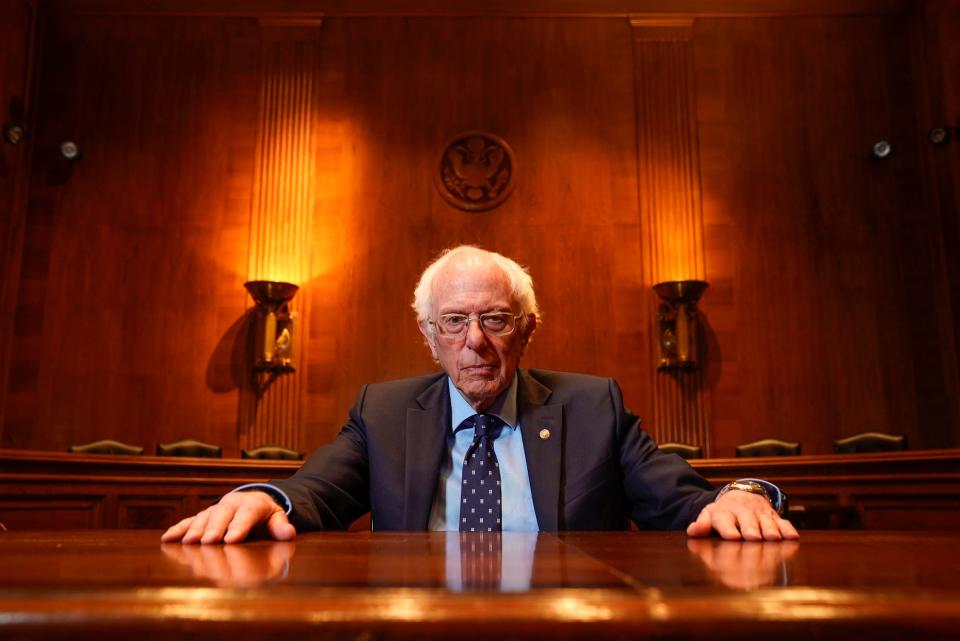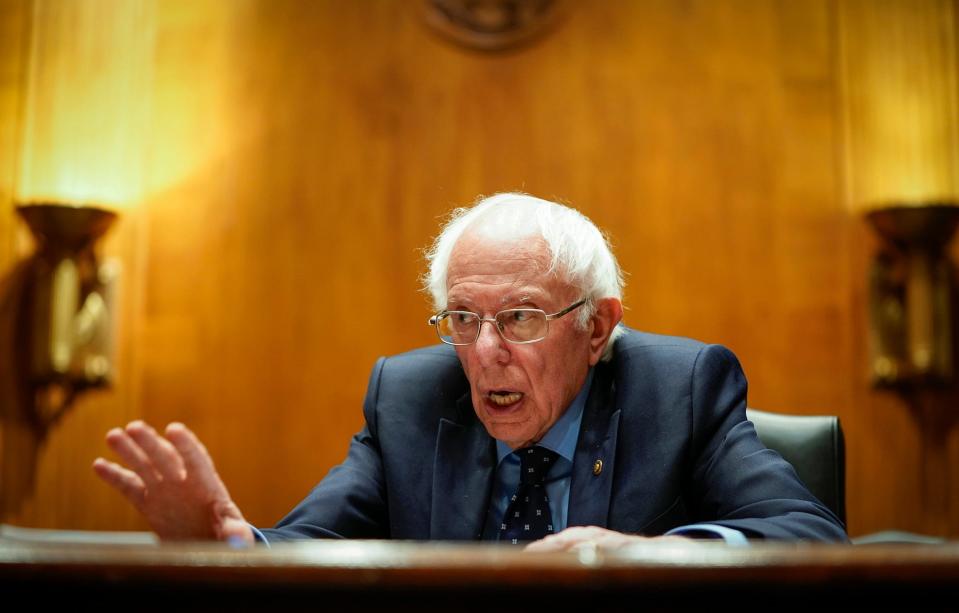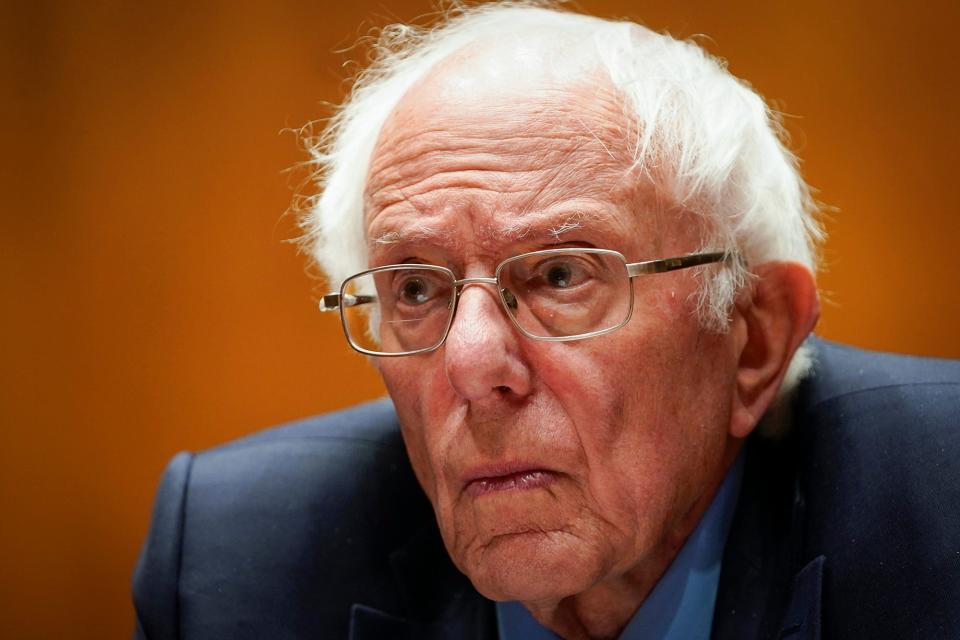Exclusive: Bernie Sanders worries young people are underestimating the threat from Trump
WASHINGTON – Sen. Bernie Sanders has always been a political maverick, but these days the longest-serving independent in U.S. congressional history is not afraid to show his pragmatic side.
In an exclusive interview with USA TODAY on Wednesday, the senior senator from Vermont spoke about topics including the Israel-Hamas war, antisemitism, college protests, and President Joe Biden’s record. One throughline that quickly became apparent was that Sanders would not let his differences with Biden on some issues get in the way of confronting something more urgent: the threat of former President Donald Trump, the presumptive Republican nominee.
He believes a policy change by Biden on Israel is long overdue, but also worries that young people are underestimating the true threat that Trump poses and in their anger over Israel and other issues, may not recognize that Biden is better on their side – even if he is not where they want him to be on Israel.
"We can be extremely upset at the Biden administration for their policies with regard to Israel and Gaza, but the difficulty is that in the real world that you live in, you've got to take a look at a whole lot of things," he said, sitting in the Health, Education, Labor and Pensions committee hearing room on Capitol Hill. "On the other hand, I would hope that most of the young people and protestors do not want to see Donald Trump, who is a racist, a sexist, a homophobe who doesn't acknowledge the reality of climate change, become elected president of the United States."
The 82-year-old lawmaker was a favorite among young voters when he ran in 2020 but ultimately endorsed Biden and became a powerful surrogate. His comments about young people and Trump come at a time when the self-described Democratic socialist is taking a more active role in messaging directly to Democrats, and also as polling shows Biden's support waning among a critical voting demographic that helped the incumbent president win the White House nearly four years ago. Sanders has built his career on his pledge to fight the powerful – including big corporations and lobbyists – to help the working class.
"I think the president has much to be proud of in terms of what he has already accomplished. I don't know if he gets credit for it," he said.

Sanders praises Biden's work on health care access, infrastructure
As chair of HELP, Sanders talked about the work he’d done with Biden to take on the pharmaceutical industry. Last month, he appeared with Biden at the White House for an event with health care advocates that focused on lowering the costs of inhalers to $35 a month, along with other Democratic efforts to expand health care access.
"For the first time in history, you'll have Medicare negotiating prices. That is a big deal for health care in general," he said.
He then proceeded to rattle off a list of the Biden administration’s accomplishments including the $1.2 trillion bipartisan infrastructure law that passed to rebuild the country’s crumbling roads, bridges, and water systems as well as addressing climate change and canceling "a lot of" student debt.
He also praised Biden for being the first president in American history to be on a picket line with United Auto Workers in Michigan, making it clear that he was "pro-union and pro-worker."
One area where Sanders is strongly at odds with the Biden administration’s "unfettered military aid" to Israel as it conducts its war on Gaza after Hamas terrorists killed 1,200 people and took more than 250 hostages in southern Israel on Oct.7. Sanders has been highly critical of the way Israeli Prime Minister Benjamin Netanyahu is prosecuting the war and holds him responsible for the humanitarian crises in Gaza.
More than 35,000 people have been killed in Gaza, according to the Hamas-run Gaza Health Ministry. Beyond the death toll, a March 18 U.N. report said a famine is "imminent" and humanitarian groups estimate more than 2 million people are threatened with famine.

At odds with policy on military aid to Israel
A Gallup survey released on March 27, a day before the Biden campaign’s fundraiser, showed 55% of all Americans disapprove of Israel’s military action. That includes 75% of Democrats, up from the 63% who said the same last November.
Biden signed a $95 billion foreign aid bill in April, which includes $26 billion in funds for Israel and humanitarian aid for Gaza and other places. Sanders voted against the measure.
Sanders said while the money has been approved by Congress and signed by the president, it has not been released yet.
"The president needs to tell Netanyahu ‘you're not going to get a nickel unless there is a huge and significant increase in humanitarian aid, that the potential of famine is ended tomorrow," he said. "You stop the terrible actions of the settlers on the West Bank and that we begin serious discussion about a two-state solution. If you want the money, these are the things you got to do."
Pro-Palestinian protest movements have sprung up around the country since police first tried to end an encampment at Columbia University in New York nearly two weeks ago. There have also been numerous instances of antisemitism recorded on campuses since the start of the war.
At the same time, student protestors have expressed concern that politicians often conflate criticism of Israel’s government with antisemitism. Netanyahu recently described the college protestors as "antisemitic mobs."
“I reject very strongly the suggestion that if people are concerned and raise strong concerns about the military that makes one anti-Semitic. That is just not the case,” Sanders said. "I really find it outrageous that Netanyahu wants to hide the outrageous military behavior of his government behind the terrible image of antisemitism."
Just as criticizing the government of Italy or Ireland does not make one anti-Italian, or anti-Irish, criticizing the government of Israel doesn’t make one anti-Jewish or anti-Semitic, he added.
But at the same time, Sanders acknowledged that anti-Semitism and Islamophobia are on the rise.
“I would say to any protestors whether it is anti-Semitism or racism against Muslim students, Black students or gay students is unacceptable. It is not what a peace movement is about,” he said. “And I strongly condemn it.”

'Solution is to mobilize the American people'
Biden has described himself as a Zionist, but these days that has become a loaded word. Some say they are not antisemites, but they're anti-Zionist. As a Jewish lawmaker himself, how does Sanders define Zionism?
"I don't sit around worrying about what the word means. All I know is that right now in Israel, you have an extreme right-wing government, which includes some out-and-out racists, period," he said. "Hamas is a terrorist organization that started this war. Israel had the right to defend itself, but it does not have the right to go to war against the entire Palestinian people."
With polls showing that many segments of the Democratic party, such as young voters, Black voters, Arab, and Muslim American voters are feeling disenchanted with Biden's stance on Gaza, what does the president need to convince these voters?"I think for a start, changing their policy to Netanyahu and Israel would be a good step forward," he said. "I think that would be the first order of business. So I think the time is long overdue to change that."
Sanders, the de facto leader of the progressive wing of the Democratic party, who has endorsed Biden says that however disenchanted the voters are the solution is not to elect a president "who admires authoritarian leaders like Putin, who's trying to undermine American democracy."
"The solution is to mobilize the American people, working-class people, Black, white, Latino, Native American, whatever they may be, to come together, to fight for a government, which represents all of us, and not just the few."
Swapna Venugopal Ramaswamy is a White House correspondent for USA TODAY. You can follow her on X, formerly Twitter, @SwapnaVenugopal
This article originally appeared on USA TODAY: Bernie Sanders worries young people are underestimating Trump threat
